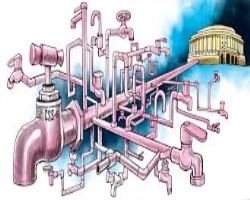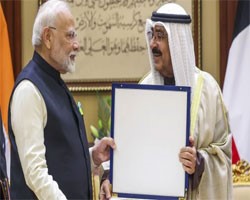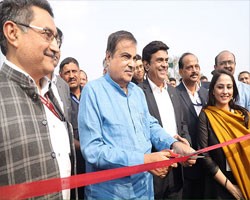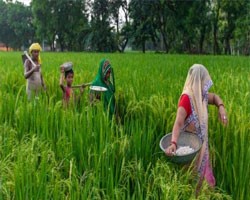SSC Current Affairs
TABLE OF CONTENTS |
| Polity and Governance |
|---|
|
|
|
Why in the news?
Timely completion of the Centrally sponsored schemes and programmes would help develop Andhra Pradesh and the officials should take proper steps in this regard, observed Union Minister of State for Rural Development Chandra Sekhar Pemmasani while participating at a review meeting at the Guntur Collectorate. About Centrally Sponsored Schemes: Definition: CSSs are Schemes that are funded jointly by centre and state and implemented through the State in sectors falling in the State and Concurrent Lists of the Constitution. Key Points: 📍These are schemes that are funded partially by both the Central and State Governments. 📍It is a channel which the central government uses to help the states run their plans financially. 📍The amount of state participation varies from state to state. 📍Their implementation rests on the Union territories and the States. 📍These schemes are further divided into three categories based on their funding patterns i.e. the core of the core, core and optional. 📍The flagship schemes of the central government are called Core of Core schemes or umbrella schemes. Examples: Mahatma Gandhi National Rural Employment Guarantee Programme (MGNREGA), National Social Assistance Programme etc. 📍Core schemes: The funding pattern is usually 60:40. The central government takes up more share in these schemes and the states are expected to pitch in the remaining funds. 📍Although, in cases of difficulty where states like North Eastern states, Jammu & Kashmir, and some special category states need extra attention, a 90:10 ratio of funding can be seen usually. Examples: Pradhan Mantri Gram Sadak Yojana (PMGSY), Pradhan Mantri A was Yojana (PMAY), Integrated Watershed Development Programme etc. 📍Optional schemes: Normally state governments plan the schemes and request the central government to fund some portion of the total outlay. The general funding pattern of the optional schemes is 50:50 (State: Center). However, the Central government may take up the task of funding more if the scheme is to be implemented in backward areas or difficult terrains. Examples: Border Area Development Programme, and Shyama Prasad Mukherjee Rurban Mission among others. How are Centrally Sponsored Schemes different from Central Sector Schemes? Centrally Sponsored Schemes are different from Central Sector Schemes in the sense that Central Sector Schemes are implemented by Center directly while Centrally Sponsored Schemes are implemented by states. CSS are extended by the Union Government to States under Article 282 of the Constitution. The mainly cover items listed in states list. |
| International Relations |
|
|
|
Why in the news?
Prime Minister Narendra Modi's visit to Kuwait on December 21-22, 2024, marked a significant milestone as the first by an Indian Prime Minister in 43 years. At the invitation of His Highness the Amir of Kuwait, Sheikh Meshal Al-Ahmad Al-Jaber Al-Sabah, this visit aimed to strengthen the longstanding ties between India and Kuwait across various sectors. Key Highlights of the Visit: Strategic Partnership: The leaders agreed to elevate bilateral relations to a 'Strategic Partnership,' reflecting a commitment to deepen cooperation in areas such as trade, investment, defense, security, energy, culture, education, technology, and people-to-people ties. Defense Cooperation: A Memorandum of Understanding (MoU) on defense was signed, providing a framework for collaboration, including joint military exercises, training, coastal defense, maritime safety, and joint development and production of defense equipment. Energy Collaboration: Discussions focused on transforming the buyer-seller relationship in the energy sector into a comprehensive partnership, with greater collaboration in upstream and downstream activities. Both sides expressed interest in Kuwait's participation in India's Strategic Petroleum Reserve Programme. Cultural and Sports Exchanges: Agreements were signed to enhance cooperation in culture and sports, including a Cultural Exchange Programme for 2025-2029 and an Executive Programme on Sports for 2025-2028. Indian Community Engagement: Prime Minister Modi addressed the Indian diaspora at the 'Hala Modi' event, acknowledging their contributions to Kuwait's development and emphasizing the strong people-to-people ties between the two nations. Arabian Gulf Cup Participation: As the Guest of Honour, Prime Minister Modi attended the opening ceremony of the 26th Arabian Gulf Cup, symbolizing the cultural and diplomatic bonds between India and Kuwait. This historic visit not only revitalized bilateral relations but also set the stage for future collaboration in various domains, reinforcing the shared values and mutual interests of India and Kuwait. Kuwait conferred its highest honour to Modi: Kuwait conferred its highest honour — ‘The Order of Mubarak Al-Kabeer’ — on Modi for his role in strengthening the relations between the two countries. |
| Science and Technology |
|
|
|
India's first bio-bitumen stretch was inaugurated by Union Minister for Road Transport and Highways, Nitin Gadkari, as part of the country's broader push to adopt more sustainable infrastructure practices. The inauguration took place in early 2024, highlighting a significant step towards eco-friendly and innovative road construction techniques.
What is Bio-Bitumen? Bio-bitumen is an alternative to traditional petroleum-based bitumen, which is commonly used in road construction. It is derived from bio-waste or organic materials such as agricultural residue, wood waste, or even algae. The aim is to reduce reliance on fossil fuels while providing a similar, if not better, quality of road material. Key Points of the Bio-Bitumen Stretch: Sustainability: Bio-bitumen helps reduce the carbon footprint of road construction by using renewable, eco-friendly materials. It can contribute to a more sustainable, circular economy, particularly in rural or agricultural areas. Enhanced Performance: Bio-bitumen has been shown to offer similar or even superior performance to conventional bitumen, particularly in terms of durability, water resistance, and temperature flexibility. Local Waste Utilization: The technology for producing bio-bitumen can help manage agricultural waste by converting it into useful materials for infrastructure. This also provides an additional income stream for rural areas, helping to reduce waste disposal problems. Impact on Road Construction: The introduction of bio-bitumen could result in more environmentally friendly roads with lower maintenance costs and longer lifespans. Additionally, it aligns with the government's goal of incorporating more green technologies into large-scale infrastructure projects. Government's Vision: The bio-bitumen stretch is part of the Indian government’s broader vision of creating sustainable, green infrastructure. Gadkari has consistently advocated for using technologies that reduce India's carbon footprint and reliance on fossil fuels. The Road Inauguration: The inauguration event was seen as a key milestone in India's infrastructure development. Nitin Gadkari emphasized that such initiatives are vital in reducing carbon emissions from the construction industry and contributing to India's commitment to climate change mitigation. This step also aligns with India's larger goals of becoming a more environmentally conscious nation, particularly in sectors like transportation and construction, which are traditionally heavy contributors to pollution. Future Implications: Scaling Up: If the pilot project is successful, bio-bitumen could be used on a larger scale across India, potentially transforming road construction methods and encouraging more green innovation in other sectors. Global Significance: India’s adoption of bio-bitumen could also set an example for other developing nations, particularly in Asia and Africa, where road infrastructure is a key priority and where sustainable technologies could make a large impact. In summary, the inauguration of India's first bio-bitumen stretch is a significant step towards environmentally conscious infrastructure and could pave the way for more widespread adoption of sustainable practices in road construction globally. IN SHORT: India’s first bio-bitumen stretch was inaugurated by Union Minister Nitin Gadkari in 2024. Bio-bitumen, an eco-friendly alternative to traditional petroleum-based bitumen, is made from organic materials like agricultural waste. The new stretch aims to promote sustainable road construction, reduce carbon emissions, and utilize local waste. This initiative aligns with India’s vision for greener infrastructure and showcases a shift toward more sustainable practices in the construction industry. If successful, it could be scaled up across the country, contributing to long-term environmental benefits. |
| Sports |
|
|
|
India has been selected to host the ISSF Junior World Cup 2025, a prestigious event in the world of shooting sports. This event will be a significant milestone for India in the international sporting arena, particularly in the sport of shooting, which has gained considerable popularity in the country.
Key Points about the ISSF Junior World Cup 2025: What is the ISSF Junior World Cup? The ISSF Junior World Cup is an international shooting competition organized by the International Shooting Sport Federation (ISSF). It is designed for junior shooters, typically under the age of 21, and is considered one of the most prestigious events for young talents in shooting sports. The competition covers various disciplines such as rifle, pistol, and shotgun. India's Role as the Host: India will host the 2025 edition of this competition, which is a proud moment for the country. It reflects the growing prominence of India in the global shooting community, as the country has produced several world-class shooters in recent years. Hosting such an event will provide a platform for young Indian shooters to compete at the highest level and gain valuable international exposure. Location and Facilities: The venue for the ISSF Junior World Cup 2025 will likely be one of India's premier shooting ranges. India has several state-of-the-art facilities, such as the Dr. Karni Singh Shooting Range in New Delhi, which could serve as a potential venue for the event. These facilities are well-equipped to meet international standards and will provide an ideal environment for the competition. Promotion of Shooting Sports in India: The decision to host the event will further boost the profile of shooting sports in India. India has a strong tradition of excellence in shooting, with athletes like Abhinav Bindra, Gagan Narang, and Manu Bhaker achieving success on the world stage. Hosting the Junior World Cup will inspire the next generation of shooters and create more opportunities for young talent to emerge. Impact on Youth Development: The ISSF Junior World Cup will offer young Indian shooters an opportunity to compete against the best in the world, enhancing their skills and helping them gain experience in international competitions. It will also motivate more youth to take up the sport, creating a talent pipeline for the future. Government and Institutional Support: The Indian government and sports bodies are expected to provide extensive support to make the event a success. India has been actively promoting sports at the grassroots level, and hosting global events like the ISSF Junior World Cup aligns with these efforts. Boost to Indian Sports Tourism: Hosting international sports events also promotes sports tourism in India. It will attract shooters, coaches, officials, and fans from around the world, thereby enhancing India’s global reputation as a sporting destination. Previous ISSF Events in India: Senior ISSF World Cup held in Bhopal (2023). Season-ending ISSF World Cup Final earlier in 2024. Total of eight top-level ISSF events hosted in India over the last decade. Conclusion: The ISSF Junior World Cup 2025 in India will be a significant event for the country's sports landscape. It will not only showcase India's growing stature in shooting sports but also provide an excellent opportunity for the country's young shooters to shine on the international stage. It is also a step towards further popularizing shooting sports in India and fostering a new generation of talent. |
| Persons in News |
|
|
|
Justice Madan B. Lokur, a retired judge of the Supreme Court of India, has been appointed as the Chairperson of the United Nations Internal Justice Council (IJC).
About Justice Madan B. Lokur: Supreme Court Tenure: Justice Lokur served on the Supreme Court of India from June 2012 until his retirement in December 2018. International Experience: In 2019, he was appointed to the Supreme Court of Fiji as a judge of its non-resident panel, becoming the first Indian judge to serve on the Supreme Court of another country. About the United Nations Internal Justice Council (IJC): Establishment: The IJC was established in 2009 to reform and strengthen the UN's internal justice system, ensuring it operates effectively, impartially, and transparently in addressing workplace disputes within the organization. Mandate: The council safeguards the independence and integrity of the internal justice system, overseeing bodies such as the UN Dispute Tribunal (UNDT) and the UN Appeals Tribunal (UNAT). Composition: The IJC comprises five members: two tribunal judges (from UNDT and UNAT), two staff representatives, and one external legal expert. The Chairperson is selected by consensus and appointed by the UN Secretary-General. Functions: The council recommends candidates for judicial positions, monitors tribunal functioning to ensure fairness, and provides expert advice on internal justice reforms. Justice Lokur's appointment is for a four-year term, ending on November 12, 2028. IN SHORT: Justice Madan B. Lokur, a retired Supreme Court of India judge, has been appointed Chairperson of the UN Internal Justice Council (IJC). The IJC oversees the independence and fairness of the UN's internal justice system, addressing workplace disputes. Justice Lokur’s appointment is for a four-year term (2024-2028). With his extensive judicial experience, including serving on the Supreme Court of Fiji, he is expected to significantly enhance the UN's justice system. |
| Important Days |
|
|
|
National Farmers Day (Kisan Diwas) 2024 will be observed on December 23, as it is every year. This day is dedicated to honoring the contributions of farmers to India's economy and society. It holds significant importance in raising awareness about the issues faced by farmers and celebrating their hard work in ensuring food security for the nation.
National Farmers’ Day 2024: Kisan Diwas History Kisan Diwas was established to honour the life and achievements of Chaudhary Charan Singh, India’s fifth Prime Minister, who served from 1979 to 1980. During his tenure, he prioritised policies aimed at improving the lives of farmers, including land reforms and initiatives to boost agricultural productivity. Due to his dedication to the welfare of the farming community, his birthday, December 23, was declared as National Farmers’ Day. National Farmers’ Day 2024: Kisan Diwas Significance Kisan Diwas highlights the crucial role farmers play in sustaining India’s economy, rural development and food security. The day serves as an opportunity to discuss key issues such as fair pricing, climate change adaptation, sustainable farming practices and access to modern technologies. It also acts as a platform for raising awareness about government schemes and reforms to improve farmers’ lives. National Farmers’ Day 2024: Kisan Diwas Facts India is a nation of agricultural abundance, with the majority of its rural population dependent on farming or agricultural-related work. Farmers are the backbone of society, working tirelessly to ensure that the nation remains nourished. Kisan Diwas is a day to better understand and appreciate the invaluable contribution of farmers to the nation. Key Points about National Farmers Day 2024: Recognition of Farmers' Contributions: The day recognizes the indispensable role that farmers play in sustaining the country’s economy, particularly the agriculture sector, which is a major source of livelihood for millions in India. Awareness and Support: National Farmers Day serves to raise awareness about the challenges faced by farmers, such as climate change, water scarcity, poor market access, and inadequate government support. It also emphasizes the need for better agricultural policies and infrastructure. Honoring Farmers: On this day, various events and activities are organized, including seminars, exhibitions, and award ceremonies, to honor the farmers’ hard work and their pivotal role in the nation’s development. Promotion of Agricultural Reforms: The day also highlights the importance of agricultural reforms and technological advancements to improve productivity and sustainability. Farmers are encouraged to adopt innovative techniques and better practices to overcome challenges. Government Initiatives: The government often uses this day to announce new initiatives for the welfare of farmers, such as subsidies, insurance schemes, and other support measures aimed at improving their livelihoods. Conclusion: National Farmers Day 2024 will continue to be an occasion to reflect on the invaluable role of farmers in shaping the future of agriculture in India, while also addressing the pressing issues that impact them. It’s a day to show gratitude and support for the millions of farmers who work tirelessly to feed the nation. |
|
<< 22-Dec-24
|
|
|





